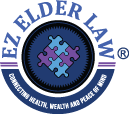
Caregiving is hard. Being a parent is hard. Being a child is hard. And sometimes you might feel like you’re not enough. You are enough and you need to listen to this song. You’re enough!

Caregiving is hard. Being a parent is hard. Being a child is hard. And sometimes you might feel like you’re not enough. You are enough and you need to listen to this song. You’re enough!

During the week of May 1, 2023, the VA updated its Adjudication Procedures Manual to clarify that a claim in which funds were withheld pending a fiduciary appointment is a claim pending at the time of death and may be paid as accrued benefits. The updated section is M21-1, Part XI, Subpart ii, Chapter 3, […]

On May 4, 2023, the Department of Community Health announced the new state-wide average nursing facility private pay rate increased from $9,034.00 to $9,584.00. This rate is the divisor when calculating the length of a transfer penalty when resources or income are transferred for less than fair market value.

When applying for Medicaid, the nursing home spouse (called the Institutionalized Spouse) is often a joint owner (or sole owner) on checking, savings and other acounts. Should those resource be taken out of the name of the Institutionalized Spouse? The answer is generally “yes,” but it requires some context and some qualifications. The context and […]

In the Matter of the Medical Assistance Pooled Special Needs Trust of Scott Hewitt (Iowa 2023), the State Medicaid agency had a contigent interest in the trust remainder due to the payback requirement in 42 U.S.C. § 1396p(d)(4)(C). However, after the beneficiary died, the master trust informed the Department that it would retain the remainder, […]

IRS Notice 2023-30 set forth the safe harbor language for extinguishment and boundary line adjustment clauses required by y § 605(d)(1) of the SECURE 2.0 Act of 2022 (SECURE 2.0 Act). It addresses only amendments to extinguishment and boundary line adjustment clauses in accordance with § 605(d) of the SECURE 2.0 Act. This safe harbor […]

David E. Hultstrom, President of Financial Architects, recently explained why past-performance is not a great way to evaluate financial advisors. Essentially, no one has a working crystal ball. Hultstrom wrote the following in the May, 2023 edition of Financial Foundations. Why would I leave out past performance in selecting an advisor, or current performance for […]

Gregory Hall created a trust for his children. He also made gifts to his children prior to his death, including a $500,000 house to his son, Kenneth. Gregory’s trust provided that, following his death, the trust remainder would be divided equally among his three children. But Kenneth argued that the $500,000 should not be included […]

On April 25, 2023, the VA issued the following announcement: The Caregiver Support Program (CSP) is introducing a new nationwide service offering comprehensive legal and financial planning services to Primary Family Caregivers enrolled in the Program of Comprehensive Assistance for Family Caregivers (PCAFC). A network of licensed attorneys and certified financial counselors are readily accessible […]

On April 18, 2023, the Biden Whitehouse issued an Executive Order on Increasing Access to High-Quality Care and Supporting Caregivers. The EO directs actions to improve job quality for the professionals who provide the critical services that make community living possible for millions of people. It includes actions to improve support for the 53 million […]